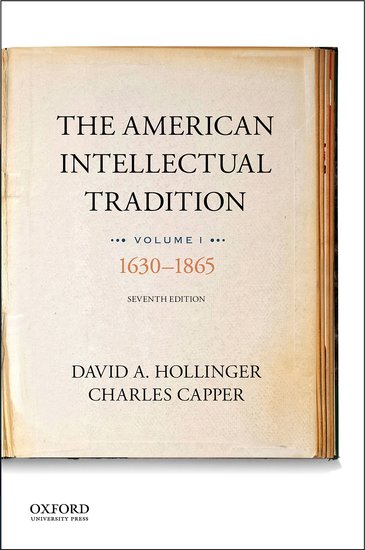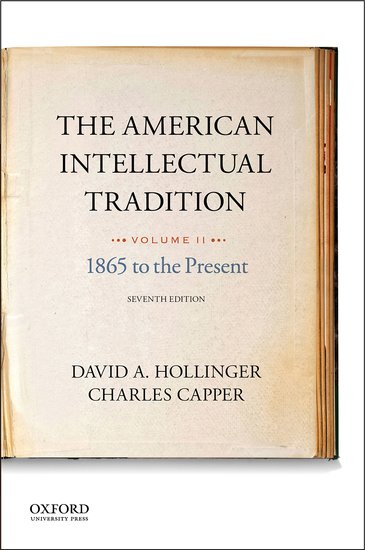Oxford University Press recently published the seventh edition of The American Intellectual Tradition, the absolutely essential two-volume anthology of key texts in American thought co-edited by David A. Hollinger and Charles Capper. Through all its editions, this anthology – usually referred to by grad students and profs alike as “Hollinger and Capper” – has formed the cornerstone of many a syllabus and many a reading list in the history of American thought and culture. It is not “the canon” – there is no such thing! – but it is at least a common lectionary, widely shared and greatly appreciated by those of us who teach or study American intellectual history. This anthology lays a goodly foundation upon which professors and students and independent scholars and interested readers can build substantive work of inquiry and interpretation. 
In fact, as a sort of common lectionary for the field, The American Intellectual Tradition (AIT) would make an ideal foundation for shared conversation among the many writers, readers and participants in our online community here at the U.S. Intellectual History Blog.
So that is what I propose to do: I will run a regular blog series here, with the aim of collaboratively working our way through the various groupings of readings in the Hollinger and Capper anthology.
Here’s how I’d like to proceed. I will run a post every other Saturday responding to one section of readings contained in the anthology. The first volume of the series (1630-1865) is divided into five sections of approximately 100-120 pages each, while the second volume contains four sections of about 120-150 pages each. In between my posts, I would be happy to run guest posts from interested participants. A brief post engaging with one or more of the anthologized texts in AIT would be the perfect way for some of our regular readers, from graduate students and early career scholars to senior historians and independent scholars, to contribute to the blog – beyond, of course, the many fine and thoughtful comments that so many of you kindly share with us as a community of writers and readers. And of course my fellow bloggers will likely be joining the conversation through posts and comments of their own.
Here’s my schedule for posting:
April 7
April 21
May 5
May 19
June 2
–vacation!!!!–
June 23
July 7
July 21
August 4
 That’s not a bad way to spend the summer. And this schedule of posts / discussions will allow those of you who are reading for comps or preparing a syllabus to talk through some reading choices, some alternate texts, some possible directions for further inquiry. The series of posts will be complete before school starts again in the fall, so it should provide a resource for further reading / study for students (and profs!) working their way through these texts throughout the school year.
That’s not a bad way to spend the summer. And this schedule of posts / discussions will allow those of you who are reading for comps or preparing a syllabus to talk through some reading choices, some alternate texts, some possible directions for further inquiry. The series of posts will be complete before school starts again in the fall, so it should provide a resource for further reading / study for students (and profs!) working their way through these texts throughout the school year.
I hope our readers will enjoy this turn or return to such an important collection of common texts. I know I will. I am still finishing my series on this blog on the Stanford “canon” (there is no such thing!), and I’ll try to complete that as well before the fall semester starts. At my own blog, I am now writing my way through a first reading of Hayden White’s Metahistory – my most recent post considers what White has to say about a possible throughline from Leibniz to Herder. Thank you to the readers who are commenting and reading along with me there. Next up is White on Hegel – or LD struggling to understand White on Hegel. Either way, it’s a useful exercise for somebody, I hope.
But I am confident that a read-through of Hollinger and Capper will be not just a useful and productive series, but a pleasant and collaborative series as well.
So let’s take this journey together through what is not just a collection of texts but is more importantly an outstanding accomplishment of the anthology’s thoughtful and praiseworthy co-editors.
If you don’t already have copies of the newest edition of Hollinger and Capper, here is a link to purchase Volume I, and here is a link to purchase Volume II.
So get ready: there’s a whole lot of Puritan theology headed your way come April 7.

0